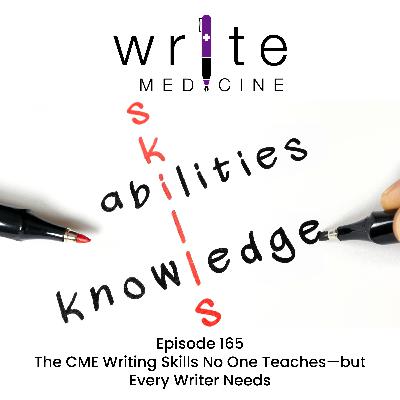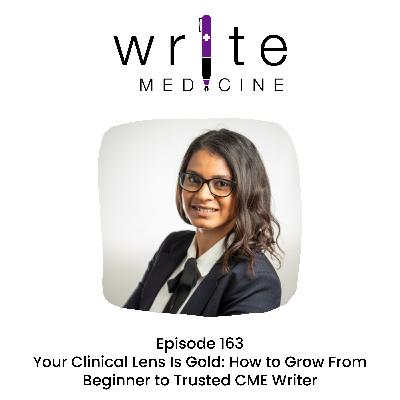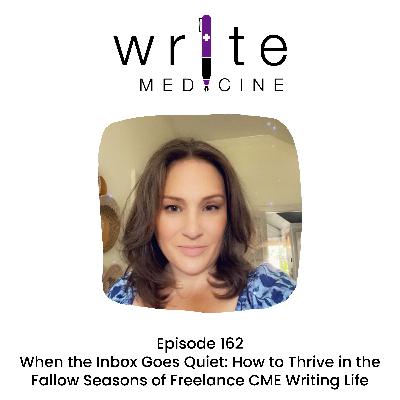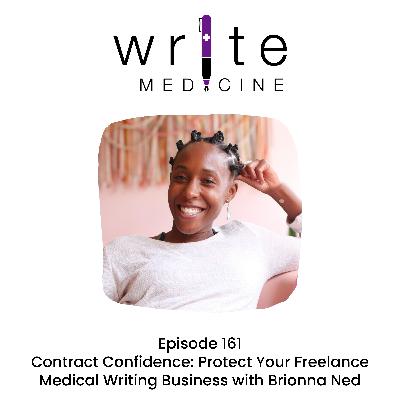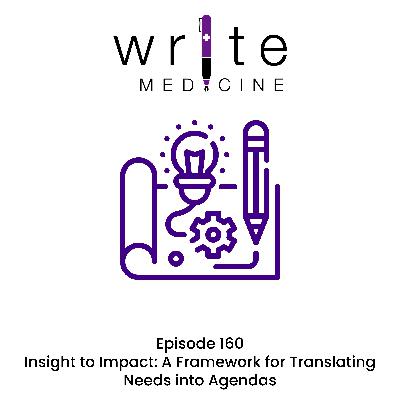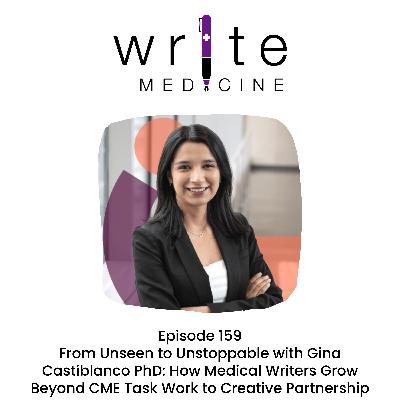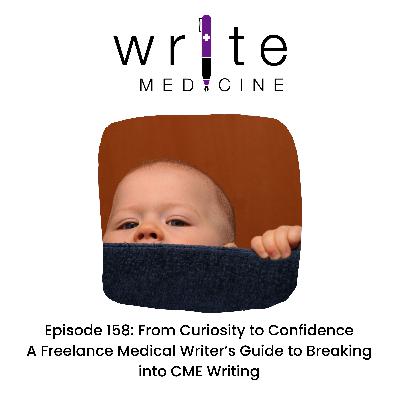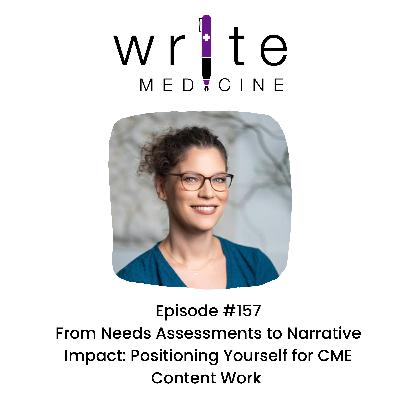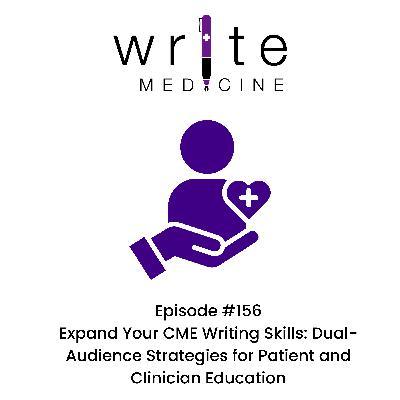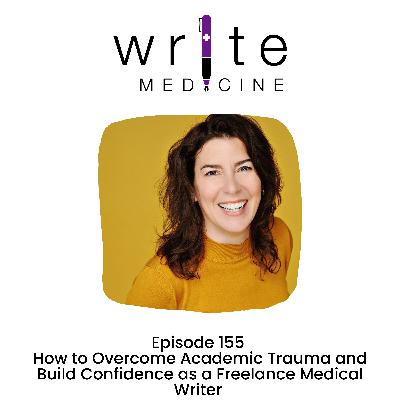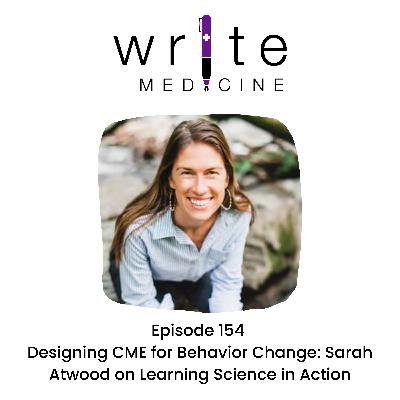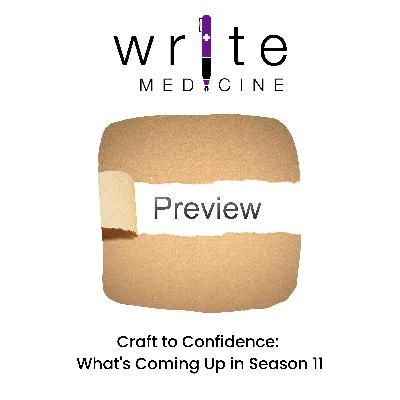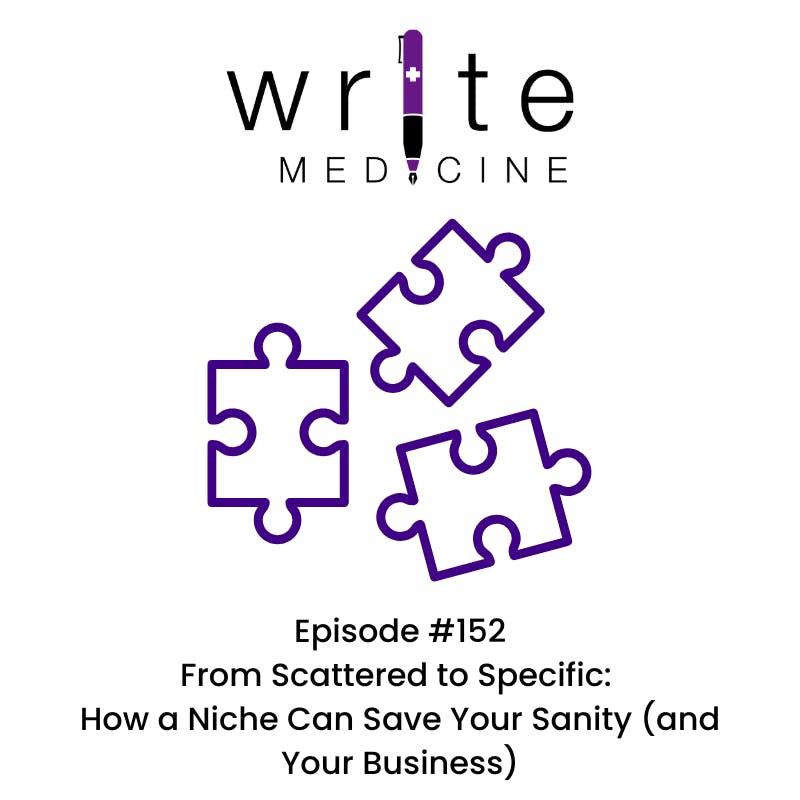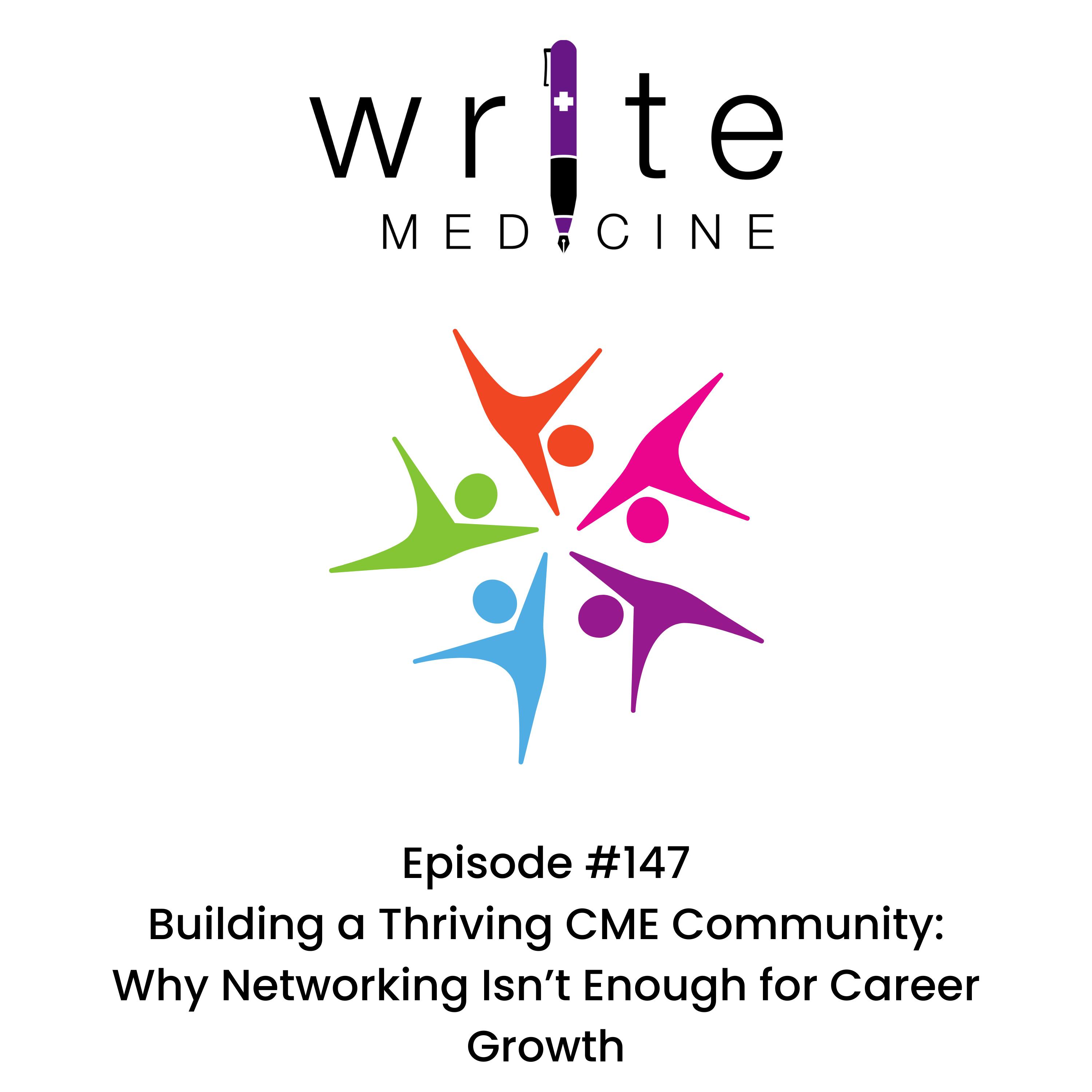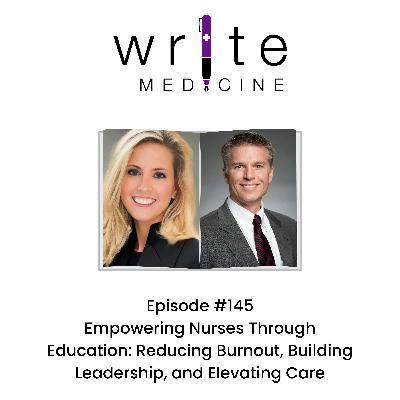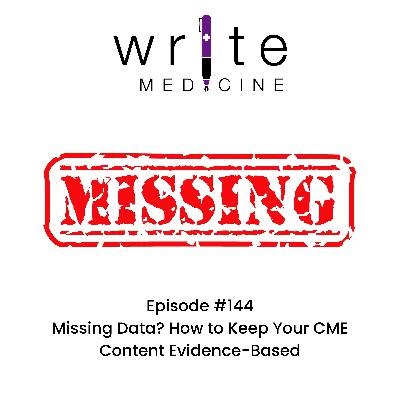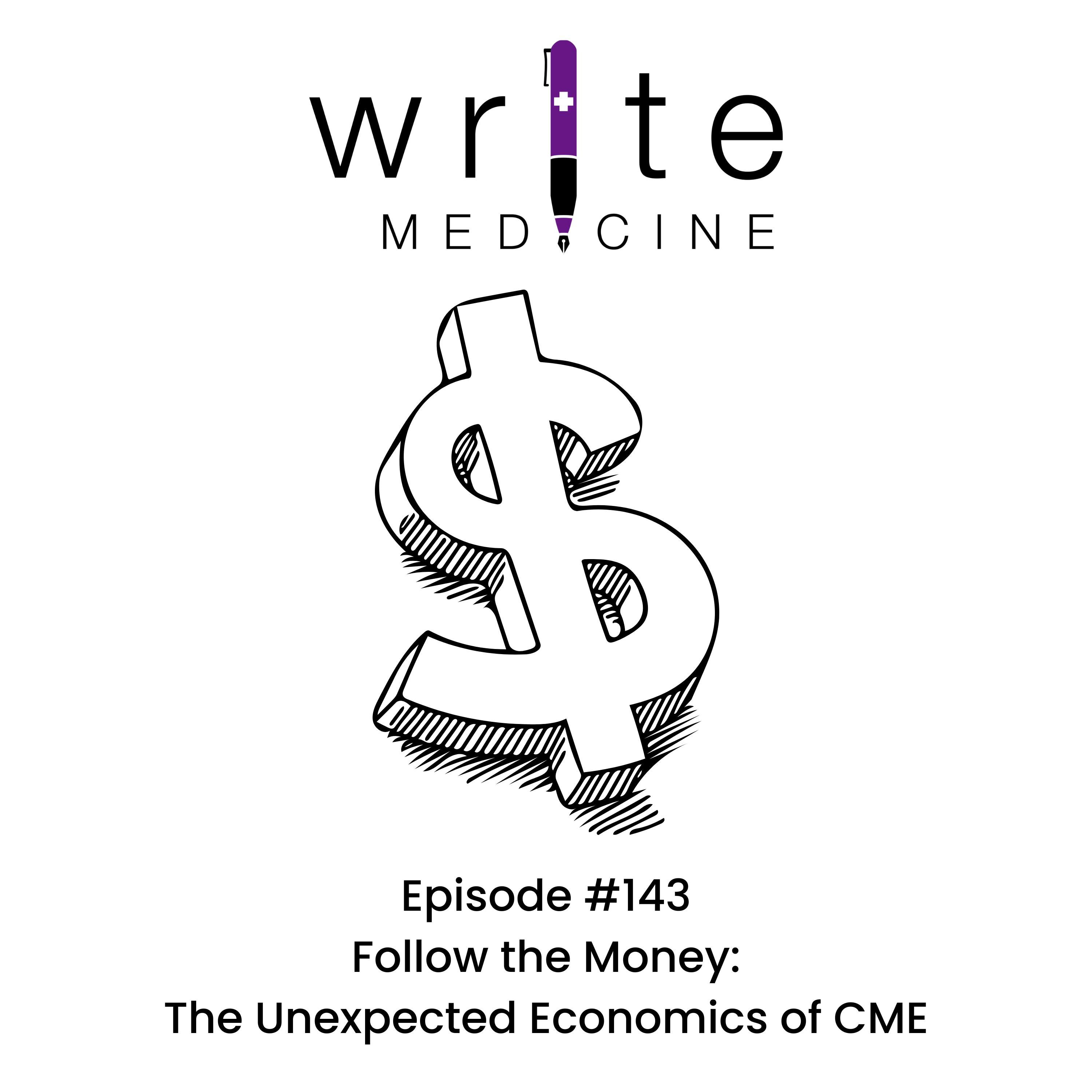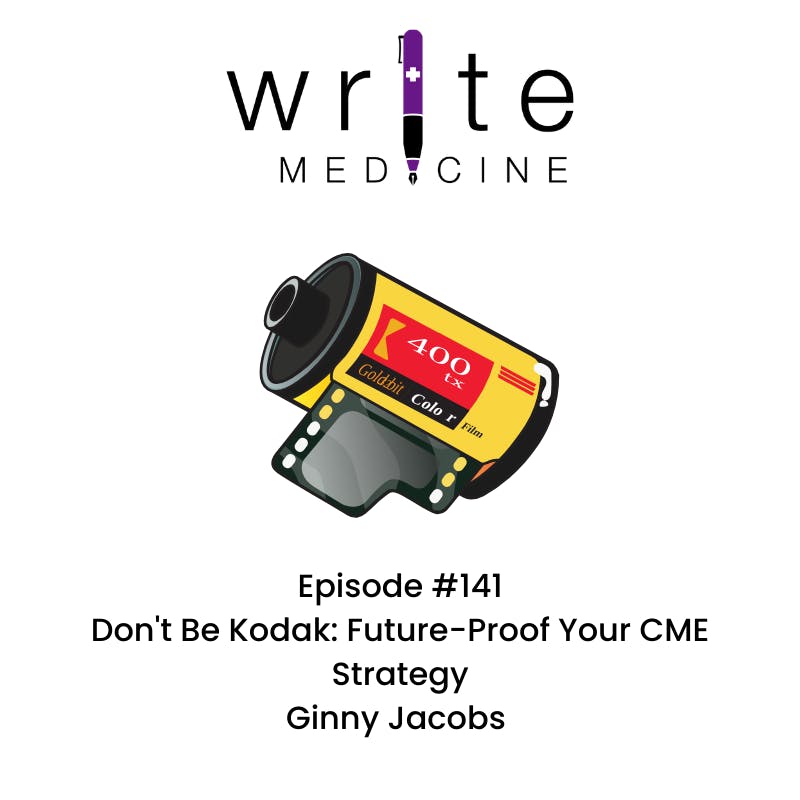Discover Write Medicine
Write Medicine

Write Medicine
Author: Alexandra Howson PhD
Subscribed: 28Played: 240Subscribe
Share
© 2024 Write Medicine
Description
If TED Talks and a mastermind group had a podcast baby for CME professionals, it would be Write Medicine.
Think of Write Medicine as the NPR of continuing medical education—smart, engaging, and always packed with insights you can use right away.
Every week, your host, Alexandra Howson PhD, cracks open the secrets of powerful CME content, decoding adult learning, designing impactful outcomes, and navigating the fast-changing world of medical education. Sometimes, she goes solo. Other times, she invites industry pros to share their expertise. Either way, you’ll get practical strategies to elevate your CME writing game.
Whether you’re just starting in CME or you're a seasoned pro looking for that extra edge, Write Medicine is your weekly power-up session for crafting education that truly makes a difference.
Listen, learn, and level up your CME game—because better education means better patient care.
This podcast uses the following third-party services for analysis:
Podtrac - https://analytics.podtrac.com/privacy-policy-gdrp
Think of Write Medicine as the NPR of continuing medical education—smart, engaging, and always packed with insights you can use right away.
Every week, your host, Alexandra Howson PhD, cracks open the secrets of powerful CME content, decoding adult learning, designing impactful outcomes, and navigating the fast-changing world of medical education. Sometimes, she goes solo. Other times, she invites industry pros to share their expertise. Either way, you’ll get practical strategies to elevate your CME writing game.
Whether you’re just starting in CME or you're a seasoned pro looking for that extra edge, Write Medicine is your weekly power-up session for crafting education that truly makes a difference.
Listen, learn, and level up your CME game—because better education means better patient care.
This podcast uses the following third-party services for analysis:
Podtrac - https://analytics.podtrac.com/privacy-policy-gdrp
155 Episodes
Reverse
You already know how to write learning objectives. You reference Bloom’s taxonomy. You understand Moore’s outcomes framework. But here’s the real question:When you write a learning objective, can you clearly identify the two to three specific clinical tasks that must happen for that objective to be achieved?In this episode—based on a webinar I participated in with the Good CME Practice Group—we go deeper than frameworks. We unpack what actually sits underneath a learning objective and how that layer determines whether your CME changes practice… or simply delivers information.What We Explore in This EpisodeWhy learning objectives are signposts—not the design itselfHow to break each objective into 2–3 concrete clinical tasksThe role of workflow, format, and audience context in determining granularityHow learning science (cognitive load, retrieval practice, feedback) strengthens action-focused designWhere CME programs most commonly lose alignment between need, content, assessment, and outcomesKey TakeawayIf you can’t name the specific clinical actions required to meet an objective, the content won’t drive behavior change.Design lives underneath the objective.Next StepIf this episode resonated, try this:Take one learning objective from a current project and ask:What are the two or three specific clinical actions underneath it?Where do those actions appear in the content?Where are they assessed?That exercise alone will elevate your design work.And if you want structured practice applying this level of thinking—with feedback, live coaching, and a community of CME professionals—explore WriteCME Pro.This is where writers become design partners.ResourcesGood CME Practice GroupMentioned in this episode:AI Practice LabBuild a Practical, Safe, Repeatable AI-assisted Workflow in Just 4 Weeks.
March 9 - April 2
Move beyond experimenting with AI. In this 4-week practice lab, work hands-on with Núria Negrão to build a documented, repeatable AI workflow for research, drafting, and quality control—one you can confidently explain to clients and teams.
This podcast uses the following third-party services for analysis: Podtrac - https://analytics.podtrac.com/privacy-policy-gdrp
In this year-end episode, Alex takes you behind the scenes into a full year of growth inside the WriteCME Pro community. Whether you're just starting in CME or deepening your expertise, you’ll hear the most important trends that emerged among CME writers in 2025—what they struggled with, how they moved forward, and what this means for your own career in 2026.If you want clarity, confidence, and a sense of belonging in the CME world, this episode offers a peek at the path forward.In this episode, you’ll learn:The biggest mindset and skill gaps CME writers faced this yearWhy understanding the ecosystem matters more than mastering templatesThe professional identity shift that helped writers step into higher-level rolesWhy wellbeing has become a non-negotiable business strategyWhat happens when writers grow inside a community instead of aloneWhat support, structure, and opportunities are coming in 2026You’ll especially benefit if you’re:A medical writer curious about entering CMEA working CME writer who feels stuck or isolatedA freelancer craving clarity, community, or better workflow systemsSomeone who wants to build a resilient, respected CME writing businessLearn more or join the community:12 Days of Giving Secret ListWriteCME ProMentioned in this episode:AI Practice LabBuild a Practical, Safe, Repeatable AI-assisted Workflow in Just 4 Weeks.
March 9 - April 2
Move beyond experimenting with AI. In this 4-week practice lab, work hands-on with Núria Negrão to build a documented, repeatable AI workflow for research, drafting, and quality control—one you can confidently explain to clients and teams.
This podcast uses the following third-party services for analysis: Podtrac - https://analytics.podtrac.com/privacy-policy-gdrp
What if you ended the year not with burnout or urgency, but with a daily ritual of inspiration, generosity, and creative momentum for your CME writing?As CME writers, so much of our work happens behind the scenes — the interviews, the needs assessments, the outlines, the manuscripts. It’s meaningful work, but it’s often quiet and relentless, yet it carries real impact for learners and patients. This episode takes you behind the curtain into the reflection, intention, and creative spark that inspired the 12 Days of Giving. If you’ve ever wanted to reconnect with the why behind your own writing, this story will resonate.In this episode, you’ll hear:My why behind the 12 Days of Giving How reflection helps us stay grounded in a profession that rarely slows down.Why generosity isn’t just a nice idea, but a practical force that strengthens your craft and the CME community.Press play to step behind the scenes and discover the heart, intention, and creative spark powering this year’s 12 Days of Giving.Ready to join the secret list? Do that here: https://www.alexhowson.com/12-days-interestMentioned in this episode:AI Practice LabBuild a Practical, Safe, Repeatable AI-assisted Workflow in Just 4 Weeks.
March 9 - April 2
Move beyond experimenting with AI. In this 4-week practice lab, work hands-on with Núria Negrão to build a documented, repeatable AI workflow for research, drafting, and quality control—one you can confidently explain to clients and teams.
This podcast uses the following third-party services for analysis: Podtrac - https://analytics.podtrac.com/privacy-policy-gdrp
In this hot seat coaching conversation, Sarah Jabeen MD, a clinician turned medical writer, brings the honest questions so many emerging CME writers quietly carry:How do I navigate a career pivot without feeling like an imposter? How do I leverage my clinical background without overwhelming my writing? And how do I grow from “new” to “trusted” in the eyes of clients?Together, we unpack what’s underneath each of these questions and explore how identity, confidence, community, and small experiments shape your growth as a CME writer.You’ll hear:Why self-doubt is a normal part of professional transformation—and how to shift from “What if this fails?” to “What if this works?”How your clinical experience becomes a true superpower in CME writing, giving you insight, relevance, and empathy that elevate your work.What separates a beginner from a trusted partner, and how reliability, curiosity, and consistent communication matter more than perfection.The role of community and belonging in building confidence and combating isolation during a career pivot.Practical guidance for showing up online, finding your voice, and creating a presence that feels aligned and safe.Whether you’re transitioning from clinical practice, entering CME writing from another discipline, or simply looking for more confidence in your craft, this episode offers permission, perspective, and a path forward.Mentioned in this episode:AI Practice LabBuild a Practical, Safe, Repeatable AI-assisted Workflow in Just 4 Weeks.
March 9 - April 2
Move beyond experimenting with AI. In this 4-week practice lab, work hands-on with Núria Negrão to build a documented, repeatable AI workflow for research, drafting, and quality control—one you can confidently explain to clients and teams.
This podcast uses the following third-party services for analysis: Podtrac - https://analytics.podtrac.com/privacy-policy-gdrp
What do you do when your inbox goes quiet and the client work that once filled your calendar suddenly disappears?For many freelance medical writers—especially those transitioning into the CME space—quiet seasons can feel like failure. But what if those fallow periods are actually the most fertile ground for growth? In this conversation with seasoned writer Addie Nagy, we explore how to reframe slow seasons, rebuild confidence, and manage client relationships with steadiness and purpose.You’ll learn how toReimagine client relationships as a dialogue rather than a power struggle so collaboration replaces anxiety.Turn information gaps and slow communication into opportunities for curiosity, clarity, and boundary-setting.Use “fallow time” to strengthen business foundations, refresh systems, and cultivate the mindset shift from freelancer to business owner.Press play to learn how to transform uncertainty into strategy and make every season of your freelance CME writing business work for you.Resources MentionedIlise Benun — The Creative Professional's Guide to Money: How to Think About It, How to Talk About it, How to Manage It. 2011. HOW Books. WriteCME Pro — a community and professional network that provides peer support and opportunities to hone CME writing skills.Mentioned in this episode:AI Practice LabBuild a Practical, Safe, Repeatable AI-assisted Workflow in Just 4 Weeks.
March 9 - April 2
Move beyond experimenting with AI. In this 4-week practice lab, work hands-on with Núria Negrão to build a documented, repeatable AI workflow for research, drafting, and quality control—one you can confidently explain to clients and teams.
LinkedIn Live AMAThis podcast uses the following third-party services for analysis: Podtrac - https://analytics.podtrac.com/privacy-policy-gdrp
Have you ever hesitated to push back on a client’s “non-negotiable” contract — even when something didn’t feel right?For freelance medical writers, contracts can be one of the most intimidating parts of running a business. Between indemnity clauses, “work made for hire” language, and shifting risk to the writer, it’s easy to feel powerless. In this episode, legal strategist Brionna Ned (The Lawless Lawyer) breaks down how to approach contract negotiations with confidence — so you can protect your work, your income, and your peace of mind. You'll learn how to:Identify and communicate your leverage points — the non-negotiables that protect your business.Decode intimidating legal terms like indemnity and work made for hire in plain language.Reframe contract negotiation from a high-stakes confrontation into a collaborative conversation about creating a fair working relationship.Press play to discover how to build contract confidence, reduce risk, and negotiate terms that support a thriving medical writing business.Connect with Brionna The Lawless LawyerInstagramThreads LinkedIn Mentioned in this episode:AI Practice LabBuild a Practical, Safe, Repeatable AI-assisted Workflow in Just 4 Weeks.
March 9 - April 2
Move beyond experimenting with AI. In this 4-week practice lab, work hands-on with Núria Negrão to build a documented, repeatable AI workflow for research, drafting, and quality control—one you can confidently explain to clients and teams.
LinkedIn Live AMAThis podcast uses the following third-party services for analysis: Podtrac - https://analytics.podtrac.com/privacy-policy-gdrp
How do you turn a detailed needs assessment full of data and practice gaps into a clear, learner-centered activity agenda that actually changes clinical practice?If you’ve ever stared at a dense needs assessment wondering how to transform pages of evidence into a coherent educational design, this episode is for you. Many CME writers struggle to bridge the gap between analysis and application—between identifying what clinicians need and structuring how they’ll learn it. In this episode, Alex shares a practical, step-by-step process that helps you connect the dots and design education that makes sense and gets results.By listening, you’ll discover:A seven-step framework to translate insights from your needs assessment into a logical, outcomes-aligned agenda.How to apply the 3-A Test—Aligned, Actionable, Appropriate—to ensure every session delivers value for learners.A real-world mini-case that illustrates how to transform your research into a compelling, structured learning journey.Press play to learn how to transform data into design—and gain the confidence to craft CME agendas that close gaps and inspire change.👉 Grab Your Insight-To-Action Framework 👉 Register for LinkedIn LiveMentioned in this episode:LinkedIn Live AMAAI Practice LabBuild a Practical, Safe, Repeatable AI-assisted Workflow in Just 4 Weeks.
March 9 - April 2
Move beyond experimenting with AI. In this 4-week practice lab, work hands-on with Núria Negrão to build a documented, repeatable AI workflow for research, drafting, and quality control—one you can confidently explain to clients and teams.
This podcast uses the following third-party services for analysis: Podtrac - https://analytics.podtrac.com/privacy-policy-gdrp
What if the work that feels invisible is the very thing building your expertise?For many CME writers, the hours spent researching, editing, and shaping educational content happen behind the scenes — valuable, but unseen. Over time, that invisibility can blur your sense of value and readiness.In this Write Medicine hot-seat coaching session, Gina Castiblanco PhD shares what it’s really like to navigate that in-between space — leaving behind a visible academic identity and learning to trust her voice as a CME writer and business owner.Together, we unpack how professional visibility starts with self-awareness, boundaries, and the courage to say, “I’m ready, even if I don’t feel ready yet.”By the end of this conversation, you’ll learn how to:Reframe invisibility as part of your growth process — not proof that you don’t belong.Use your academic and clinical background to shape a distinct CME writing identity.Turn your unseen skills into visible value that attracts aligned clients and projects.Shift from doing the work to owning the work — as a creative, strategic partner.Stay to the end of the episode for three practical steps you can take today to start making your invisible work visible — and strengthen your visibility, voice, and value in the CME ecosystem.Mentioned in this episode:AI Practice LabBuild a Practical, Safe, Repeatable AI-assisted Workflow in Just 4 Weeks.
March 9 - April 2
Move beyond experimenting with AI. In this 4-week practice lab, work hands-on with Núria Negrão to build a documented, repeatable AI workflow for research, drafting, and quality control—one you can confidently explain to clients and teams.
This podcast uses the following third-party services for analysis: Podtrac - https://analytics.podtrac.com/privacy-policy-gdrp
Curious about continuing medical education (CME) writing but not sure how to begin? In this episode, you’ll learn how to turn your medical, academic, or scientific experience into a meaningful, flexible writing career. Discover the five milestones that help you break into CME writing, the key skills every CME writer needs, and real-world insights from the field.🎧 Tune in now to gain clarity, confidence, and your next steps toward becoming a successful CME writer.LinksWriteCME Pro – Join the CPD-certified professional development program for medical writers specializing in CME.Chart Your CME Writing Path – Map your skills and identify opportunities in CME writing.Episodes 112 & 115 of Write Medicine – Learn how to streamline literature reviews and strengthen your research workflow.American Medical Writers Association (AMWA) – Explore professional development resources for medical communicators.CME Writer Bootcamp: How to Break into CME/CE Writing with no Network and No ExpertiseWrite Medicine Mentor – Get behind-the-scenes insights and templates to deepen your CME writing practice.How to Create Portfolio Samples for CME WritingMentioned in this episode:AI Practice LabBuild a Practical, Safe, Repeatable AI-assisted Workflow in Just 4 Weeks.
March 9 - April 2
Move beyond experimenting with AI. In this 4-week practice lab, work hands-on with Núria Negrão to build a documented, repeatable AI workflow for research, drafting, and quality control—one you can confidently explain to clients and teams.
Write Medicine MentorWrite Medicine Mentor is your private companion podcast designed exclusively for medical writers who want deeper support as they grow in continuing medical education (CME). Each month, you'll receive exclusive content from me to support your business and income growth as well as templates/checklists/swipe files you can use and apply to client projects.
In addition to immediate access to a CME writing starter pack, each month you’ll get:
* A bonus episode that takes you behind the mic for advanced insights into the craft and business of CME writing.
* A ready-to-use template, checklist, or swipe file to make your projects smoother and more effective.
* An Ask Me Anything episode, where Alexandra Howson, PhD, answers your questions about writing, clients, CME strategy, and sustainable freelance life.
Think of this podcast as your personal, earbud-friendly mentor—practical, honest, and always focused on helping you sharpen your skills, expand your opportunities, and thrive as a CME writer.This podcast uses the following third-party services for analysis: Podtrac - https://analytics.podtrac.com/privacy-policy-gdrp
Are you ready to move beyond writing needs assessments and step into the creative, story-driven side of CME—without losing the clients or confidence you’ve already built?Many CME writers start with needs assessments. They’re structured, strategic, and an excellent way to learn the landscape. But what happens when you feel ready for more? When you want to create content that sparks learning, integrates clinical insight, and allows your creativity to shine? In this hot seat coaching episode, we meet Zsuzsa Csik, an anesthesiologist and critical care physician turned CME writer, who’s navigating that exact transition—and learning how to position herself for content work while building a sustainable freelance business.By listening, you’ll discover:How to strategically signal to clients that you’re ready for content creation projects.Practical ways to use your clinical or scientific background as a bridge, not a barrier, to new opportunities.Simple positioning tactics to align your current work with your long-term professional goals.Press play now to learn how to move from analysis to creation, and start shaping the CME writing career you really want.Mentioned in this episode:AI Practice LabBuild a Practical, Safe, Repeatable AI-assisted Workflow in Just 4 Weeks.
March 9 - April 2
Move beyond experimenting with AI. In this 4-week practice lab, work hands-on with Núria Negrão to build a documented, repeatable AI workflow for research, drafting, and quality control—one you can confidently explain to clients and teams.
This podcast uses the following third-party services for analysis: Podtrac - https://analytics.podtrac.com/privacy-policy-gdrp
How do you take one complex medical concept and make it clear, accurate, and actionable for both clinicians and patients, without losing credibility?If you’re a CME writer, you know the challenge of translating science into education that actually sticks. But as more CME projects tether clinician education with patient-facing components, the real test is flexing your craft to serve two very different audiences at once. Get this right, and you not only improve learning, you expand your professional scope and impact.In this episode, you’ll discover:How to apply practical frameworks to dual-audience writing.Structural techniques that make content engaging, empathetic, and accessible.A simple 3-sentence exercise to sharpen clarity for patients and precision for clinicians—anytime, anywhere.🎧 Tune in now and learn how to expand your CME writing craft into dual-audience education with one portable tool you can start using today.ResourcesResources to support plain language, readability, and accessibility. https://readable.com/readability/Cognitive accessibilityThe Patient Education Materials Assessment Tool (PEMAT) Informed consent navigator toolPlain Language SummariesPlain Language Checklist for Health Professionals Plain language in biobank consent Plain Language AssociationCognitive accessibilityInformed consent navigator toolEpisodes MentionedEP31: Cultivating a Visual Mindset with Karen Roy and Bhaval ShahEP 41: Nurture Connection-Tell them a Story with Ben RiggsEP109: Crafting Inclusive and Accessible Medical Content with Virginia ChachatiPractice: Explain one complex idea in three sentences, twice—once for patients, once for clinicians.Take one complex concept: SGLT2 inhibitors reduce heart failure hospitalizations.For patients:What it is: “These medicines...
What if leaving academia—or another tightly defined professional path—felt less like failure and more like freedom?For many academics, clinicians, and researchers, stepping into freelance medical writing isn’t just a career change—it’s a profound identity shift. Too often, this transition carries grief, shame, or the lingering sense of “not enough.” In this episode, we explore how those feelings show up, why they matter, and how to reframe them as fuel for your writing career.By listening, you’ll discover:Why the transition from academia or clinical practice can feel like trauma—and how to reframe it as strength.Four entrepreneurial habits that can help you thrive as a freelance medical writer while avoiding their shadow sides.Simple, practical practices—like free writing and mindful self-awareness—that help you claim permission, rebuild confidence, and cultivate a sustainable business mindset.Press play now to learn how to navigate identity loss, tap into your natural strengths, and take small steps toward building a medical writing business that feels truly your own.Mentioned in this episode:AI Practice LabBuild a Practical, Safe, Repeatable AI-assisted Workflow in Just 4 Weeks.
March 9 - April 2
Move beyond experimenting with AI. In this 4-week practice lab, work hands-on with Núria Negrão to build a documented, repeatable AI workflow for research, drafting, and quality control—one you can confidently explain to clients and teams.
Write Medicine MentorWrite Medicine Mentor is your private companion podcast designed exclusively for medical writers who want deeper support as they grow in continuing medical education (CME). Each month, you'll receive exclusive content from me to support your business and income growth as well as templates/checklists/swipe files you can use and apply to client projects.
In addition to immediate access to a CME writing starter pack, each month you’ll get:
* A bonus episode that takes you behind the mic for advanced insights into the craft and business of CME writing.
* A ready-to-use template, checklist, or swipe file to make your projects smoother and more effective.
* An Ask Me Anything episode, where Alexandra Howson, PhD, answers your questions about writing, clients, CME strategy, and sustainable freelance life.
Think of this podcast as your personal, earbud-friendly mentor—practical, honest, and always focused on helping you sharpen your skills, expand your opportunities, and thrive as a CME writer.This podcast uses the following third-party services for analysis: Podtrac - https://analytics.podtrac.com/privacy-policy-gdrp
What if the CME you design could do more than deliver knowledge—what if it could actually change clinician behavior and improve patient care?As a CME writer or education professional, you’ve likely felt the frustration of producing content that looks strong on paper but doesn’t translate into meaningful practice change. This episode explores how learning science, human-centered design, and patient co-creation can help you bridge the gap between information and impact.By listening, you will discover:Learning science principles, like Mayer’s multimedia principles, that make education stick.The difference between learning change and behavior change, and why both matter in CME.How aligning clinician and patient education fosters shared decision-making and better healthcare outcomes.Press play now to learn practical strategies you can use to design CME that transforms knowledge into real-world change.Mentioned in this episode:AI Practice LabBuild a Practical, Safe, Repeatable AI-assisted Workflow in Just 4 Weeks.
March 9 - April 2
Move beyond experimenting with AI. In this 4-week practice lab, work hands-on with Núria Negrão to build a documented, repeatable AI workflow for research, drafting, and quality control—one you can confidently explain to clients and teams.
This podcast uses the following third-party services for analysis: Podtrac - https://analytics.podtrac.com/privacy-policy-gdrp
What does it take to move from order-taker to trusted partner in CME writing?That’s the single question driving this new season of Write Medicine.In this 15-minute teaser episode, Alex introduces the season theme—Craft to Confidence: A CME Writer’s Season of Growth—and gives you a preview of what’s ahead. You’ll hear how guest interviews and solo tactical episodes will work together to help you build your skills, expand your visibility, and strengthen your confidence as a CME writer.Whether you’re transitioning from academia, clinical practice, or another writing specialty, this season will give you both the craft tools and the career clarity to thrive in continuing medical education.Episodes to Look Forward ToDesigning for learning with Sarah AtwoodHot Seat Coaching on attracting content projects and integrating academic skills into CMELeveraging Milkshake Moments with Michelle SkidmoreIdentity, trauma, and resilience with Hope LaffertySolo walk-throughs on interviewing SMEs, turning education gaps and needs into activity agendas, publishing manuscripts, and moreMentioned in this episode:AI Practice LabBuild a Practical, Safe, Repeatable AI-assisted Workflow in Just 4 Weeks.
March 9 - April 2
Move beyond experimenting with AI. In this 4-week practice lab, work hands-on with Núria Negrão to build a documented, repeatable AI workflow for research, drafting, and quality control—one you can confidently explain to clients and teams.
Write Medicine MentorWrite Medicine Mentor is your private companion podcast designed exclusively for medical writers who want deeper support as they grow in continuing medical education (CME). Each month, you'll receive exclusive content from me to support your business and income growth as well as templates/checklists/swipe files you can use and apply to client projects.
In addition to immediate access to a CME writing starter pack, each month you’ll get:
* A bonus episode that takes you behind the mic for advanced insights into the craft and business of CME writing.
* A ready-to-use template, checklist, or swipe file to make your projects smoother and more effective.
* An Ask Me Anything episode, where Alexandra Howson, PhD, answers your questions about writing, clients, CME strategy, and sustainable freelance life.
Think of this podcast as your personal, earbud-friendly mentor—practical, honest, and always focused on helping you sharpen your skills, expand your opportunities, and thrive as a CME writer.This podcast uses the following third-party services for analysis: Podtrac - https://analytics.podtrac.com/privacy-policy-gdrp
Are you a freelance CME writer juggling too many project types and wondering if it’s time to finally “niche down”?
In the world of continuing medical education (CME), clarity and focus aren’t just nice to have—they’re essential for sustainable business growth. If you’re feeling stretched thin, jumping between clients and therapeutic areas, this episode explores how finding a niche can reduce overwhelm, streamline your process, and even attract the kinds of clients who value what you do most. Here’s what you’ll gain from this episode:
A practical definition of what a niche is—and what it isn’t—so you can stop second-guessing yourself.
Examples of how different niches can emerge from your background, preferences, or even your favorite types of client relationships.
A step-by-step approach to experimenting your way into a niche, without the pressure to get it “perfect” from the start.
Tune in now to learn how niching can simplify your business, supercharge your marketing, and help you find work that truly energizes you.
LINKS
Grab the Niche Discovery Checklist
Signup for Summer Script Camp
If you are looking for ongoing CME content strategy tips, tools, and tactics, subscribe to the Write Medicine Insider newsletter.
Get TextExpander
Mentioned in this episode:AI Practice LabBuild a Practical, Safe, Repeatable AI-assisted Workflow in Just 4 Weeks.
March 9 - April 2
Move beyond experimenting with AI. In this 4-week practice lab, work hands-on with Núria Negrão to build a documented, repeatable AI workflow for research, drafting, and quality control—one you can confidently explain to clients and teams.
This podcast uses the following third-party services for analysis: Podtrac - https://analytics.podtrac.com/privacy-policy-gdrp
Do you ever feel like you're navigating your career in CME alone, unsure of where you fit in or how to grow without burning out?Many CME professionals work independently or remotely, which can be both rewarding and isolating. Beyond professional networks, building a true community can provide the support, engagement, and inspiration needed to thrive in this field. In this episode, we explore why community matters in CME, how it enhances career growth and well-being, and practical steps you can take to create meaningful connections.
Discover how a strong professional community can boost your career and well-being.
Understand the key elements that define a thriving professional community.
Learn practical ways to engage in and build a community that supports your growth in CME.
Listen now to uncover the power of community in CME and learn how to cultivate meaningful professional connections that will support your long-term success.Timestamps00:00 Introduction: Navigating the CME Field Alone00:48 The Importance of Community in CME01:50 Defining Community and Its Elements02:38 Personal Experiences of Belonging03:50 Shared Values and Mutual Support in CME05:08 Networks vs. Communities06:29 Benefits of Community for CME Professionals10:19 Practical Steps to Engage in Community11:01 Conclusion and Next StepsNext WriteCME Accelerator Cohort is May, 2025.Join the Waitlist.
Mentioned in this episode:AI Practice LabBuild a Practical, Safe, Repeatable AI-assisted Workflow in Just 4 Weeks.
March 9 - April 2
Move beyond experimenting with AI. In this 4-week practice lab, work hands-on with Núria Negrão to build a documented, repeatable AI workflow for research, drafting, and quality control—one you can confidently explain to clients and teams.
This podcast uses the following third-party services for analysis: Podtrac - https://analytics.podtrac.com/privacy-policy-gdrp
How can continuing education transform nursing practice, reduce burnout, and empower nurses to advocate for themselves?Nurses are essential to patient care, yet many struggle with limited access to high-quality education, workplace advocacy, and professional development. As CME professionals and medical writers, we have the power to create learning experiences that not only enhance clinical skills but also support nurse well-being and retention. In this episode, we dive into the evolving landscape of nursing education with Drs. Jennifer Shepard and Sean DeGarmo, two leaders from the American Nurses Association (ANA), who explore how we can design more impactful, outcomes-driven education for nurses.
Discover how the 2025 Code of Ethics for Nurses is reshaping professional development and why it matters for your CME programs.
Learn how continuing education directly combats burnout and improves nurse retention—and what that means for healthcare organizations.
Gain insights into the challenges of funding and implementing nurse education, and strategies to advocate for protected education budgets.
Press play now to learn how you can contribute to the future of nursing education and design CE programs that truly make a difference!AbbreviationsHere are the acronyms mentioned in the episode along with their full forms:
ANA – American Nurses Association
CNE – Continuing Nursing Education
CMS – Centers for Medicare & Medicaid Services
CE – Continuing Education
CME – Continuing Medical Education
APP – Advanced Practice Provider
DNP – Doctor of Nursing Practice
PPE – Personal Protective Equipment
PHI – Protected Health Information
PI – Personal Information
LACE – Licensure, Accreditation, Certification, and Education
GME – Graduate Medical Education
OPP – Organizational Practice Policies
AAPA – American Academy of Physician Associates
LACE – Licensure, Accreditation, Certification, and Education
Timestamps00:00 Introduction to Nursing Education Challenges00:40 Meet the Experts: Dr. Jennifer Shepard and Dr. Sean de Garmo01:54 The 2025 Code of Ethics for Nurses08:02 Addressing Gaps in Nursing Education10:41 The Importance of Continuing Education in Combating Burnout16:40 Advocating for Nursing Education and Professional Development24:04 Outcomes-Based Education and Interdisciplinary Collaboration34:50 Conclusion: The Lifeline of Continuing Education
Mentioned in this episode:AI Practice LabBuild a Practical, Safe, Repeatable AI-assisted Workflow in Just 4 Weeks.
March 9 - April 2
Move beyond experimenting with AI. In this 4-week practice lab, work hands-on with Núria Negrão to build a documented, repeatable AI workflow for research, drafting, and quality control—one you can confidently explain to clients and teams.
This podcast uses the following third-party services for analysis: Podtrac - https://analytics.podtrac.com/privacy-policy-gdrp
What happens when the data you rely on for CME content suddenly disappears? CME depends on credible, transparent data to inform healthcare professionals and improve patient outcomes. But new policy shifts have restricted access to essential sources, leaving medical writers scrambling for alternatives. Without these data points, how can we continue producing accurate, impactful education? This episode explores how to navigate these challenges and source reliable evidence for CME content.Tune in to learn where to find alternative, credible health data sources beyond federal agencies.Don’t let disappearing data derail your CME planning. ResourceGrab your link to a living spreadsheet of alternative data and evidence sources. Timestamps00:00 Introduction: The Challenge of Disappearing Public Health Data01:20 Impact of Data Removal on Public Health05:40 Alternative Data Sources for CME Professionals09:33 Actionable Steps for CME Professionals10:52 Conclusion and Call to Action
Mentioned in this episode:AI Practice LabBuild a Practical, Safe, Repeatable AI-assisted Workflow in Just 4 Weeks.
March 9 - April 2
Move beyond experimenting with AI. In this 4-week practice lab, work hands-on with Núria Negrão to build a documented, repeatable AI workflow for research, drafting, and quality control—one you can confidently explain to clients and teams.
This podcast uses the following third-party services for analysis: Podtrac - https://analytics.podtrac.com/privacy-policy-gdrp
Is private equity's growing influence in continuing medical education changing the quality of learning in the health professions?As a CME professional, you need to navigate an increasingly complex funding landscape where commercial support has dropped, and private equity firms are rapidly acquiring education providers. Understanding these shifts is crucial for developing sustainable, high-quality educational programs and navigating your way as a CME professional.In this episode, we’ll explore:
How CME funding has evolved from primarily university-based to a complex mix of commercial support, registration fees, and private investment
Why private equity firms are acquiring CME providers and what this means for content development
Key strategies for maintaining educational quality and professional relationships in an environment of frequent mergers and acquisitions
Listen now to gain insights into the $4.23 billion CME industry's funding transformation and position yourself for success in this rapidly changing landscape.Timestamps00:00 Introduction: The Art of Hustling Pool and CME00:54 AI Bootcamp for Medical Writers01:32 The Complex Financial Side of CME02:06 Evolution of CME Funding02:42 Pharmaceutical Influence and Regulations05:47 The Impact of Compliance and Regulatory Codes07:06 Current CME Funding Landscape08:21 Private Equity in CME10:48 Challenges and Questions for CME Professionals12:08 Conclusion: Ensuring Educational QualityResources
Ratnasekera A, Impact of private equity on graduate medical education: A slippery slope. Am J Surg. https://doi.org/10.1016/j.amjsurg.2024.116160
ACCME's Standards for Integrity and Independence in Continuing Education (2020)
ACCME Data Report. Thriving Through Growth and Innovation—2023.
ACCME. Toolkit for the Standards for Integrity and Independence in Accredited Continuing Education
Mentioned in this episode:AI Practice LabBuild a Practical, Safe, Repeatable AI-assisted Workflow in Just 4 Weeks.
March 9 - April 2
Move beyond experimenting with AI. In this 4-week practice lab, work hands-on with Núria Negrão to build a documented, repeatable AI workflow for research, drafting, and quality control—one you can confidently explain to clients and teams.
This podcast uses the following third-party services for analysis: Podtrac - https://analytics.podtrac.com/privacy-policy-gdrp
In this episode of Write Medicine, I speak with Ginny Jacobs, Principal of Quality Catalyst Group, about the necessary disruption happening in continuing medical education (CME). Drawing from her recent co-authored Almanac article, Ginny discusses four major shifts in the field and what they mean for CME professionals.Four Major Shifts in CME:
Increased use of technology, including artificial intelligence
Evolution in the science of learning and cognitive load
Technology utilization for clinical practice relevance
Development of adaptive and collaborative models across disciplines
Key Takeaways:
Data collection and analysis remain significant challenges for many CME organizations
The importance of "unlearning" outdated approaches while maintaining what works
Strategic alignment with organizational priorities is crucial for success
The field must evolve from episodic learning to sustainable, data-driven approaches
Looking Ahead:
Need for more systematic professional development in CME
Importance of collaboration to avoid common challenges
Focus on creating nimble educational systems with robust assessment
Emphasis on critical thinking and practical application
ResourcesJacobs G, McGowan B, Paynter N, et al. Necessary Disruption 2.0: A Continuing Education Call to Action. Alliance Almanac. Nov 18, 2024. Alliance Annual Conference, January 8-11, Gaylord Palms Resort, Orlando, FL.
Mentioned in this episode:AI Practice LabBuild a Practical, Safe, Repeatable AI-assisted Workflow in Just 4 Weeks.
March 9 - April 2
Move beyond experimenting with AI. In this 4-week practice lab, work hands-on with Núria Negrão to build a documented, repeatable AI workflow for research, drafting, and quality control—one you can confidently explain to clients and teams.
This podcast uses the following third-party services for analysis: Podtrac - https://analytics.podtrac.com/privacy-policy-gdrp



